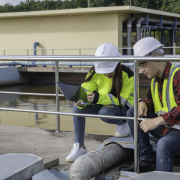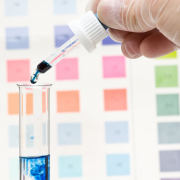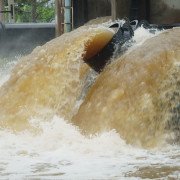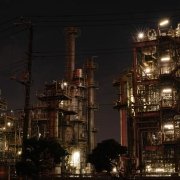Improving Effluent Treatment in the Food Industry
Taking steps to improve effluent treatment in the food industry can lead to significant process improvements; it can save businesses money, keep them the right side of the law and improve environmental performance. All good news, but where do you start?
This short technical guide has been prepared by the wastewater specialists at Water Treatment Services and outlines the obligations food businesses have in dealing with the waste they generate as part of their day-to-day activities. It then goes on to look in more detail at a number of practical steps that can be taken to improve the treatment of wastewater and effluent in this sector.
Dealing with waste and effluent in the food industry
In the UK it’s the responsibility of every business operating in the food industry to be familiar with their legal responsibilities when it comes to the management and disposal of the waste their business produces.
This is especially true when it comes to discharging their trade effluent or contaminated wastewater to the public sewer, surface water or ground water sources.
It’s important to remember that this type of waste discharge cannot be done without consulting the local environmental regulator first and getting their formal consent.
If a business is found to be discharging trade effluent or wastewater without being authorised to do so, it risks prosecution, fines and potentially prohibition notices.
Effluent treatment and discharge consents for food businesses
If your food business is considering discharging effluent into the public sewerage system, you will first have to get a trade effluent agreement or consent from the company or authority which provides your water and sewerage services – this is essential.
The key point for all food business owners is to remember that your business has a legal responsibility to deal with the waste it produces, whether that be in solid or liquid forms.
This responsibility starts on the day the waste is produced and ends when it is recycled or disposed of correctly.
Food business owners are also legally responsible for the actions of any third party they choose to help them through the process including waste management contractors.
The term waste is defined not only as solid waste, but also liquid waste, sludges or screening.
Who is responsible for the treatment of your effluent?
If the plan is to use sludge from an effluent treatment plant to spread on land, then this might require a waste management licence.
This still applies even if you out-source the work to a third-party contractor who will be spreading the effluent on your behalf.
In some cases, companies might be eligible for an exemption from these requirements.
But before you assume that you are eligible for an exemption you should speak to the environmental regulator in your area to see if your operation qualifies.
Whether you have an exemption or an agreed waste management licence, there are still some important things which all food businesses must adhere to.
All business involved in the food industry must make sure that their waste does not:
Improving effluent treatment performance in the food sector
Although every food business will operate under slightly different circumstances, there are a number of measures that have the potential to significantly improve the treatment of wastewater and effluent in the food industry.
Conduct a wastewater treatability study
A wastewater treatability study involves looking at the wastewater a business produces and then reviewing the best way of treating it from a process, environmental, regulatory and cost perspective.
Such studies tend to take a step-back from the every-day tasks of dealing with food processing and waste management and look at activities from a more strategic perspective.
Managing food waste and effluent treatment plant
Food companies should manage their effluent treatment plant carefully to ensure they are able to treat all wastewater and effluent produced on a daily basis.
Doing this will ensure compliance with the conditions of whatever licence the water company has granted.
Good housekeeping processes and control measures will help minimise both the strength and variation of the type of trade effluent in the incoming feed.
Load balancing and flow can be used to reduce the impact of shock loads on any effluent treatment plant, and balancing tanks can be useful tools for managing daily fluctuations.
In emergencies, dump tanks or holding tanks can be used to store unexpected volumes of trade effluent from food processes.
Managing drains to control fats, oils and grease (FOG)
It is essential that you place grate covers and catch pots over all food drains.
These covers and catch pots will stop food waste accidentally entering the drain and minimise the build-up of fats, oils and grease or FOG.
Covers or catch pots should also stay in place during any cleaning operations.
Grease traps fitted to drainage systems will also help to prevent fat and grease building up in the sewers and creating “fatbergs”.
Food companies should have a regular programme of inspection, cleaning and maintenance for all their grease traps to make sure potential blockages are identified early and they continue to work efficiently.
Spills should be dealt with promptly, using whichever dry clean up method is appropriate.
Brush or vacuum up spills rather than using a hose to wash the spilled liquid into a drain.
Drains should also be designed to be resistant to cleaning products and chemicals, as these types of products can be very corrosive.
Storage considerations for wastewater and effluent
It is important that food businesses plan ahead and make sure that there is enough storage for the quantity of wastewater, trade effluent and sludge produced.
This should take into account that during bad weather, it may not be possible to deal with waste sludge by spreading it on land.
Managing food facility cleaning processes
The volume of specialist cleaning products which you use as part of your food operations should be kept to a minimum.
Many commercial cleaning products designed for the food processing sector can cause serious pollution issues when discharged at higher concentrations.
They may not only pollute the local water courses, but may also affect the way in which your wastewater treatment plant operates.
Staff should be trained to use cleaning chemicals carefully, efficiently and only in accordance with the manufacturer’s instructions.
Train staff to remove as much food residue, dirt, debris and product from equipment before the cleaning process starts.
Pigging systems can be also used to push the product through the equipment.
Another option is to leave longer timescales for the equipment to drain through.
Effluent treatment solutions for the food industry
Water Treatment Services offer a comprehensive range of effluent treatment solutions for the food industry.
Learn how we help reduce trade effluent discharge costs, achieve regulatory compliance and improve environmental performance.
Our experts provide advice and support to identify the best strategies for managing industrial wastewater and effluent streams.
With offices in London serving the South and South East England, Manchester (North West), Birmingham (Midlands), Bristol (South East England and Wales), Leeds (North and North East) and Glasgow (Scotland), supported by regional teams of specially trained engineers, wastewater specialists and technicians we offer cost effective environmental support solutions across the whole of the UK and Ireland.
Contact us today to learn how our food effluent solutions can help you.
Further reading…
Learn more about our wastewater and effluent treatment solutions











